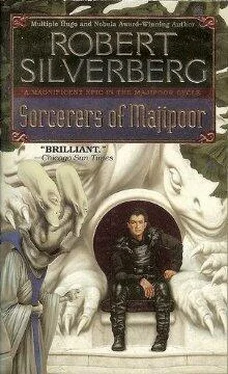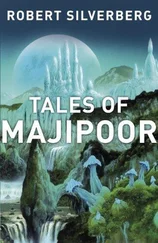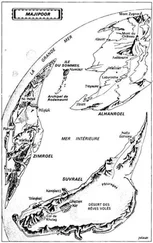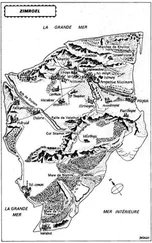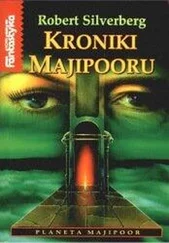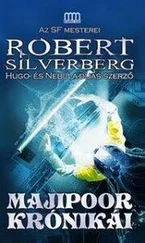The night was moonless; there was no illumination except from the terrifying bolts of lightning that flashed again and again. Rain came in torrents, driven sidewise into their faces by the relentless wind. But that wind blew from the west and carried their little boats swiftly across. Prestimion made his crossing in one of the smallest boats, accompanied only by Gialaurys and his brother Taradath: they talked of nothing but the coming battle.
Forty-seven miles of muddy riverbank separated them now from Farholt’s encampment.
“Now,” Prestimion said, “we begin our march.”
There was no dry moment all the way south; slipping and sliding through the mud was the only mode of progress, and yet they marched. When they made camp, it was in miserable sodden mud; when they marched again, it was through driving rain. Yet they were all of good cheer.
Septach Melayn was in place by now; he had made his first feint across the river; Farholt, if he had any sense, would have his strongest forces lined up along the riverbank, looking outward toward Septach Melayn’s camp and ready to beat off the lunatic onslaught from the west whenever Septach Melayn actually deigned to launch it.
But first—first—
Under cover of darkness and storm Prestimion advanced steadily down the eastern shore until he was within striking distance of Farholt’s encampment. It was a heavy gamble: would Septach Melayn be a sufficient distraction? And would he, once he began his crossing of the river, be able to make it safely to the other side? And would the rest of the army be in the right place at the right time for the culminating stroke? Prestimion could only time his own attack with care and hope for the best.
He led the troop of archers himself, withTaradath at his side. Gialaurys, on his right flank, had charge of the javelin-men, and to his left were the long spears, under Thurm and golden Spalirises. Duke Miaule would lead the cavalry, holding back in the rear until the question of the mollitors was resolved, for even the finest war-mounts were in dire fear of mollitors and would be useless if the great monsters were to charge.
“Come now,” said Prestimion, and led the way forward against Farholt.
It was almost a perfect surprise attack.
Farholt indeed had deployed the heart of his force along the riverbank, waiting for Septach Melayn. For two nights the false crossings had put Farholt’s men on full alert, and then the supposed attack had come to nothing, so that it began to seem to the royalist forces that Septach Melayn intended merely to feint night after night. There was, inevitably, a decline of vigilance on Farholt’s side; but still he kept his line intact along the river, with the bulk of the mollitors in readiness to hurl the rebels back into the river if ever they attempted to come ashore.
This night, though, Septach Melayn’s attack was no feint. And while he led his boats past the midpoint of the river and toward the wailing royalists, Prestimion’s band of archers came down into Farholt’s camp from the other side. If it had been a complete surprise, the battle might have ended with a rout in its first minutes; but some men of Farholt, happening by chance to be following some strayed mounts into the woods that lay just north of the camp, saw by the light of a lightning-bolt Prestimion’s men descending a low hill toward them, and ran screaming back to camp to sound the alarm. And so Farholt was granted just enough time to redeploy one segment of his force to meet the unexpected incursion from his rear.
“Look, brother,” said Prestimion to Taradath between two great thunderclaps. “They come running to their deaths.” And he drew and put an arrow into one of Farholt’s captains; and Taradath, aiming right after him, felled another.
The slaughter was fearful. A hail of arrows fell upon Farholt’s bewildered men as they charged uphill through the mud in the darkness. Of the mollitors, there was no sign: it seemed they were still down at the water’s edge, waiting for Septach Melayn. So it was safe for Prestimion to bring the cavalry into play, and he sent word to Miaule to move his division forward.
Farholt, aware now of the magnitude of the unexpected attack behind him, was desperately dividing his forces, sending battalion after battalion to meet the thrust of Prestimion’s men. Plainly, he had underestimated the size of the rebel army, nor had he expected them to come upon him from two sides at once; and most of his own men were still camped for the night, struggling slowly to make ready for battle. Prestimion now signaled Thurm and Spalirises to swing into action with the spearmen, and Gialaurys from the other side to enfold the royalists with his javelins. “We have them!” he called out to Prestimion in a great booming shout that could be heard from one side of the battlefield to the other. “Prestimion! Prestimion! All hail Lord Prestimion!”
Now Farholt’s men were falling back under the diabolical onslaught of Prestimion’s archers, while the infantrymen on both flanks herded the royalists toward the center of the camp. Septach Melayn was on shore now that much was evident from the wild trumpeting of the mollitors in the distance. Prestimion, standing in the thick of things, found himself wondering in an astounded bemused way whether they might be able to put the royalist army entirely to flight all at once, here at the very beginning of the struggle, as his force and Septach Melayn’s came together like the halves of a nutcracker with the royalists between them.
But that would be too simple to hope for, he knew. He pushed such thoughts from his mind and gave all his concentration to his bow. The arrows flew forth, and nearly every one found its mark.
Who these men were that he was bringing down, Prestimion attempted not to consider, though he could not help recognizing some. He saw the stunned look on the face of Hyle of Espledawn, and another who might have been Travin of Ginoissa, as he pierced them through. But there was no time to regret such things now. He aimed again, at a man holding an energy-thrower. There were a few such weapons in Farholt’s army, and very dangerous weapons they were; but they were wildly erratic also, for the art of making them, having been lost a thousand years before, was but newly revived and not yet with much skill. The man had the muzzle of his weapon pointed at Prestimion from fifty yards’ distance. But Prestimion put a shaft through his throat while he was still fumbling with the buttons and studs that controlled its beam.
Shouts came from Prestimion’s left. He glanced down that way and saw that the momentum of the battle, which had been all with his forces at first, had begun to change. Farholt’s people were rallying; or, at least, were holding their own.
No longer, now, was Prestimion’s band of archers gleefully advancing with utter freedom on Farholt’s camp. The sheer mass of Farholt’s army was too great. Caught between Septach Melayn’s landing-party and Prestimion’s rear-guard attack, they had no place to go; and now they were standing firm between the forest and the river. The suddenness of the double attack had turned them into little more than a mob, but they were an armed and sturdy mob, and they feared for their lives. So they held their ground, butting up against their attackers and refusing to yield an inch. They were locked face-to-face with them the way Farholt and Gialaurys once had been in that wrestling match long ago in the Labyrinth.
Archers were no longer of much use in this sort of struggle. Preeminence had passed to the battalions led by Gialaurys, Spalirises, and Thurm, who needed less space for the use of their weapons. They prodded and jabbed with their spears and javelins, while Miaule’s cavalrymen rode about the outside of the melee, hacking with swords and axes at Farholt’s men from above.
Читать дальше
